||| FROM ELISABETH ROBSON |||
Ecological overshoot is not a topic I hear the citizens of San Juan County discussing often. So, to help kickstart such conversations, I am hosting three online events about ecological overshoot. The first, was on November 14 with presenter Dr. William (Bill) Rees, introduced the concept of ecological overshoot.
Bill explained that humanity is well into overshoot: we are destroying the biophysical basis of our own existence by using far more resources than can be regenerated by Earth, and producing far more waste than the Earth can assimilate. Using the ecological footprint analysis he pioneered during his long career as a population ecologist and ecological economist, he estimates that each year, humanity is overshooting the carrying capacity of Earth by 72%—meaning humanity’s global footprint requires 1.75 Earths to sustain.
Ecological overshoot is the name we give the problem—so what are this problems’ symptoms? We can see the symptoms of ecological overshoot in biodiversity loss, habitat destruction, deforestation, wildlife loss, species extinctions, fresh water scarcity, soil contamination, air pollution, water pollution, and more. Some of our pollution, like micro plastics, mercury, PCBs, dioxins, excess carbon dioxide, nuclear waste, and PFAS “forever chemicals” will be marking our time on Earth for hundreds, thousands, or perhaps even millions of years.
Climate change is just one of the many symptoms of ecological overshoot, and yet it is usually the only one the decision-makers in San Juan County seem particularly concerned about. I call this having “carbon tunnel vision” and visualize it like this:
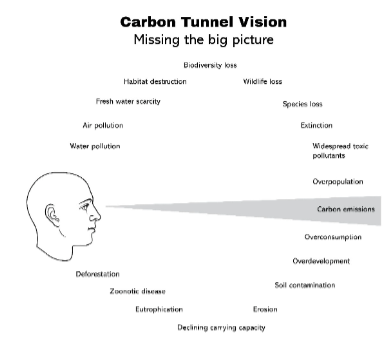
We see this carbon tunnel vision reflected in county plans and policies. Let’s take the San Juan County comprehensive plan—the comp plan as we all call it—as an example. The comp plan is, as it says, “the centerpiece of local planning in the County,” “San Juan County’s principal planning document.”
What does the comp plan have to say about ecological overshoot? Almost nothing. The comp plan lays out a vision for life-as-we-know-it to continue mostly as is. The only aspect of ecological overshoot the plan considers at any length and depth is climate change. Climate resiliency even gets its own icon in the plan document, along with a statement that “prioritizing a diversified economy, systems resiliency, adaptation planning and goals that remediate, sequester and reduce carbon emissions are incorporated into the elements of this updated plan.”
There is essentially nothing about the many other serious symptoms of ecological overshoot mentioned, discussed or addressed in depth in the plan. The plan pays brief lip service to the importance of the natural world; for instance, it describes the 2036 vision for the natural environment as “pollution-free,” with clean air and uncontaminated soil and recognizes that “the natural environment is central to ecological health, quality of life, and the economy in the islands.”
But there is no recognition of the broader implications of ecological overshoot. There is no in-depth pollution plan. No habitat loss plan. No biodiversity loss plan. No plan to deal with overpopulation, overconsumption, or overdevelopment. In other words, there is no plan to reduce our ecological footprint here in San Juan County. All symptoms of ecological overshoot are ignored, except for climate change.
Why is this?
Dr. Jeremy Jiménez presented on November 28 at the second part of our ecological overshoot series with a talk titled Why Climate is the Wrong Focus. He identifies three reasons why so many people focus almost exclusively on carbon emissions and climate change.
First, we can see climate change is happening: we watch weather reports from around the world and see increasing floods, droughts, heat waves, and the impacts of sea level rise and ocean acidification and some of us experience these ourselves.
Second, atmospheric concentrations of carbon dioxide and methane, the primary greenhouse gas emissions contributing to climate change, are more easily measured than many other symptoms of ecological overshoot, so we have a measurement bias.
The other symptoms of ecological overshoot are often more nebulous and difficult to measure, or are simply studied less, perhaps due to lack of funding, lack of interest, or lack of available expertise.
Third, and perhaps most on-the-money, corporations have created technologies and industries they can sell to the world as “solutions” to climate change. These “solutions” allow corporations and the governments they influence to believe we can continue business-as-usual. The pervasive propaganda about these “solutions” allows us regular folk to believe we can continue life-as-we-know-it without having to worry too much because “someone’s doing something about climate change.”
Carbon tunnel vision is dangerous. It ignores the many other dire ecological crises we face, some of which are as existential a threat to our well-being as climate change, or worse, as Jeremy explained in his presentation. We ignore them at our peril.
It is not surprising that our county planners, the county council, and our county utility, OPALCO, focus so myopically on climate change and carbon emissions. Indeed, state legislation ensures that they do so. For instance, WA State law RCW 70A.45.020 requires that WA State achieve net zero greenhouse gas emissions by 2050. The 2019 Clean Energy Transformation Act (CETA) commits WA to “an electricity supply free of greenhouse gas emissions by 2045.” And the 2021 Climate Commitment Act (CCA) “creates a market-based program to cap and reduce greenhouse gas emissions.”
No other symptom of ecological overshoot has such clear cut, goal-oriented legislation as carbon emissions. These state laws and others, as well as federal incentives such as the Infrastructure Law of 2021 and the Inflation Reduction Act of 2022, put the focus squarely on carbon emissions. This focus means other problems get short shrift. And the “solutions” that corporations are selling us in order to meet the goals set by federal and state law will actually make many of the other symptoms of ecological overshoot worse. Far worse.
As far as I can tell, our county’s “centerpiece of local planning” is ignoring every symptom of ecological overshoot except climate change. The plan assumes San Juan County’s population will continue to grow, along with the economy, pretending that we can have both a “sustainable economy” and “respect the natural world”. In an economy dependent on continuous growth—GDP must, on average, rise 2-3% per year or the economy is in recession, and with growing GDP grows energy and materials extraction and use—there is no such thing as a “sustainable economy.”
Recall from Bill’s presentation that North Americans have an ecological footprint on average ten times greater than can be sustained by the Earth. So when the comp plan says, “We support a diverse, resilient, and sustainable economy” and “A high quality of life cannot be maintained without a vibrant economy,” the plan is encouraging us to continue and even grow our already utterly unsustainable ecological footprint here in the county.
This graph from Bill’s presentation illustrates what this means for us here in San Juan County and for humanity at large:
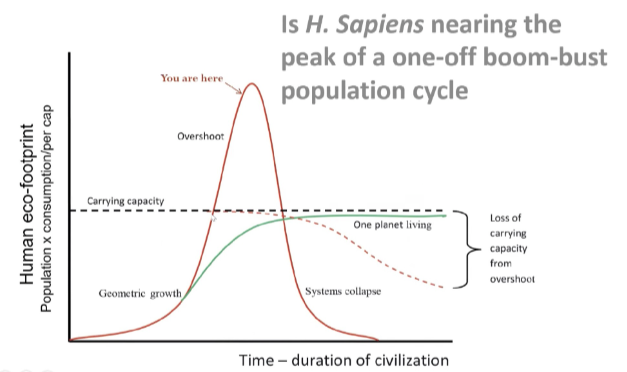
San Juan County’s planning documents assume that the upside of that graph will continue upwards indefinitely. This is simply not possible on a finite planet with finite resources and ecosystems already shattering under pressure. Basic laws of ecology tell us that when a species overshoots the regenerative capacity of its environment, that species will collapse. This is true for humans too. Our county documents do not reflect this reality in any way. This is shortsighted at best; a catastrophe at worst.
I’ve been picking on the comp plan, but other planning documents fail in the same ways. OPALCO’s plans for the future assume a growing demand for electricity—thanks to population growth, EV charging, switching homes to heat pumps, and electrifying the ferries—and focus squarely on how to meet that demand. They make no effort to recognize ecological overshoot and its implications, or address the impacts that “electrifying everything” will have on the natural world and how it will exacerbate the many other symptoms of ecological overshoot. OPALCO’s plans make little effort beyond “efficiency” to suggest we might want to use less energy. Now, remember from Jeremy’s presentation that efficiency usually leads to more growth (Jevon’s Paradox), and you can see the problem.
The San Juan Islands Destination Management Plan likewise assumes a growing economy, growing population, and growing tourism, all of which make ecological overshoot worse.
Jeremy ended his presentation asking the question: Are we on Team Modern Civilization? Or are we on Team Community of Life? Because we can’t be on both teams. We must pick one. We know where Team Modern Civilization ends—ecological overshoot always ends in collapse. Currently, all our county documents reflect that the county is squarely on Team Modern Civilization. Is this really what we want? Or do we citizens of San Juan County want to switch to Team Community of Life?
What would switching to Team Community of Life look like? As a first step in the right direction, it would mean eliminating our carbon tunnel vision and expanding our vision to see the big picture:
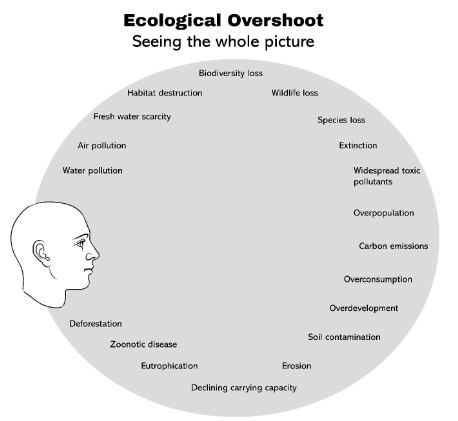
It would also mean defending the land, the water, the air, and the natural communities of the county, including our own human communities, with everything we’ve got.
On December 12, our final speaker in the series, Max Wilbert, will show us what it means to be firmly on Team Community of Life. Join us then. In the meantime, I hope you’ll watch Bill’s presentation here and Jeremy’s presentation here and consider what being on Team Community of Life might look like for you and for San Juan County.
Final presentation: December 12, 5:30pm PT on Zoom.
**If you are reading theOrcasonian for free, thank your fellow islanders. If you would like to support theOrcasonian CLICK HERE to set your modestly-priced, voluntary subscription. Otherwise, no worries; we’re happy to share with you.**






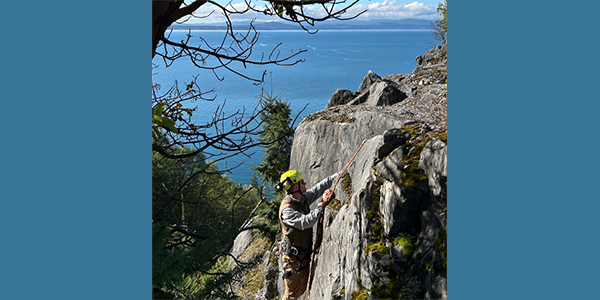
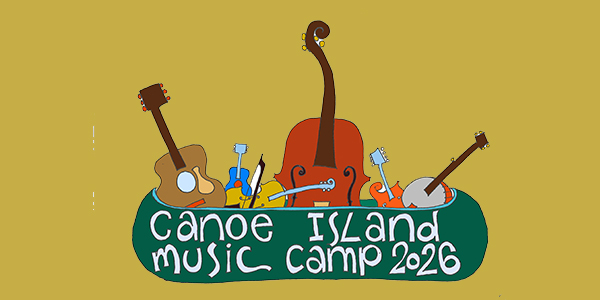
The Complan deals only with what the county hopes to do with its own tax-raised discretionary funds. In addition, its powers to limit activities are not as extensive as people think. An inventory of our county’s powers in areas of concern would be interesting, but time-consuming (trans, expensive) to assemble. With the help of a lobbyist, some holes could be patched. This is an intensely political issue, both locally and statewide. Lobbyists with different views have already done a lot of work.
OPALCO is, like government, in the service business, but is likewise limited to its own affairs and concerns, which involve safely providing adequate and reliable electric power to its members. I do take issue with the criticism of “efficiency,” the producer of what over 40 years ago Amory Lovins coined “negawatts.” Yes, there may be an ultimate power consumption increase, but with efficiency (1) the power used is squeaky clean compared to that generate by fossil fuels, and (2) efficiency is not the cause of increased energy consumption; it decreases what consumption would otherwise be without it. Jevon’s Paradox assumes that no one adjusts their consumption, and that the lowered price through efficiency will cause increased consumption. This is true treating people as pure economic creatures, but the point we all recognize is that more than economics in involved. The Paradox does not apply to those whose actions are not driven by pure economic motives.
I don’t think the point here is what institutions do, or how people visualize or understand things. The issue is what people actually do. That’s us. Just us, not them. We’re dealing with a topic illustrated by a dollar bill on the sidewalk. It’s not ours, but If we don’t pick it up, someone else will. Similarly, if we conserve and behave as we wish others to behave, someone else will consume /destroy/sell to the public the natural resource that we save. Therefore, we (1) wait for others to move first, or (2) seek an institution to regulate the behavior of everyone so our sacrifice won’t be lost. Meanwhile, we wait and blame institutions.
We claim to be unique individuals We have a superb opportunity to prove it by living as we think others should. Nothing beats example, and the cumulative result could be heartening.
Thank you for posting this series Ms. Robson. I find it both fascinatingly complex, as well as fascinatingly simple. I love it when people put the dots together on complex matters in such a manner that allows the average person some understanding of the issue. In contrast to Bill’s feelings that we’re the problem, I tend to think the problems stemming from ecological overreach are now systemic in nature, and are, by and large, created by institutions. That doesn’t mean that we, as individuals, don’t bear responsibility for our actions, but let’s face it, this is an issue of such enormity that until society forces us to change our habits (like societal breakdown)… it’s not going to happen.
To your question of “Why is San Juan County not talking about Ecological Overshoot?”
Beyond the perpetual, default “Who’s gonna pay for it,” I believe that the complexity and the sheer magnitude of the issue is a big part of the answer. I also feel that you partially answered your own question when you state, “It would also mean defending the land, the water, the air, and the natural communities of the county, including our own human communities, with everything we’ve got.”
This meaning that we’d have to change the status quo approach to life as we know it, from one of balancing economy, environment and people (which really means economy), to a whole different approach as we know it, (which is, of course, the gist of your article), we’d have to give up the luxuries that we’ve come to enjoy.
In discussing the article with a friend earlier she stated it well when she said,
“The real problem is that nobody (none of us!) wants to give up our comforts and conveniences & luxuries, and those who are not wealthy enough to afford them want to have them too. Things like warm homes, vehicles that move faster than oxen, meat to eat, coffee and a million more things that would have been unobtainably expensive a couple of hundred years ago are now seen as minimal & normal.
And she furthered,
“I was reading an article about housing the other day. Before the Great Depression, the average size of a family house in the USA was 900 to 1300 sq. ft, and five people on average lived in one, and only about a third of homes had complete indoor plumbing. Now, the average house size is around 2700 sq.ft, and two people live in one. Not sustainable. Normal.”
I’m also reminded that, as humans, we are only moved to do something when it’s an imminent threat… and this is perhaps, “not imminent enough yet.” Like frogs in warming water is the comparison that comes to mind.
Despite the fact that “Humans are destroying the biophysical basis of their own existence,” the rest of your question might be answered by some of the major takeaways that were given from P-1 of the first presentation–
“Humans are not cognitively equipped to deal with the global crisis,” and, “Overshoot is, in turn, a symptom of profound, chronic civilizational dysfunction.”
By the time humanity overcomes its greed and comes to terms with this it will, I fear, be too late.
The comp plan is, as it says in the document, a vision and a plan for San Juan County. I fully realize it has no power—it is a vision document, a planning document, and reflects a future we the people of San Juan County aim for. Right? Isn’t that the point of a planning document?
My point is that our principle planning document doesn’t reflect reality.
Likewise, OPALCO is a public utility. Yes they have a narrow mandate to supply electricity as we the people of San Juan County demand it. We are OPALCO, OPALCO is us, and is driven by what we demand. What we seem to be demanding is growth—more electricity to supply higher demand from more population, more tourism, and more electricity use.
My point is that SJC is already in ecological overshoot and demanding, and then using, more electricity will only make that worse.
I’m not blaming the comp plan or OPALCO’s plans or any other institution; I’m simply trying to start conversations about the fact that our county’s planning documents do not reflect reality. As I point out in the article, our county’s documents reflect attitudes, regulations, and incentives at the state and federal levels as well. These attitudes—of perpetual growth and framing climate as THE problem rather than just one of many symptoms of the problem—do not reflect reality either. Shouldn’t we be talking about this?
Jevon’s Paradox is precisely a reflection of the obvious fact that no one adjusts their consumption down as a result of increased efficiency. If you have a car that gets 1 mpg of gas, you’ll drive it a LOT less than if you have a car that gets 100 mpg. More efficiency = more people buying cars, more driving, more roads, more gas stations, more hotel rooms, more tourism, etc. A more efficient car leads to more energy use.
You’ve presented us with a false dichotomy in limiting our options to waiting for others to move first or seeking an institution to regulate our behavior. We have other options.
There are no personal solutions to social problems. You suggest that we can live as we think others should, as an example. This cannot just be personal if we as a county want to live in a way that reflects reality. We could “move first” by seriously considering the implications of ecological overshoot, and creating a vision written down in our planning documents that reflects this reality. We could talk more seriously about what living as if we are in ecological overshoot might look like. Not waiting and doing nothing, not trying to regulate it, but talking about it, planning for it, and coming up with ideas for how we show the rest of WA and the US and the world what it means to take ecological overshoot seriously. We could live by example as an entire county, not just as a few individuals. As I point out, most in this county (myself included) have an ecological footprint FAR beyond what the Earth can sustain. So let’s not “grow” our footprints; let’s talk about how we shrink them. If someone else picks up the dollar bills we leave behind on the sidewalk, then so be it, but living as if we understand reality will surely prepare us better for that reality, don’t you think? Surely that’s better than ignoring it.
As Jeremy said in his presentation, in answer to a question about why he talks about ecological overshoot: we talk about it for our children, for future generations, and for the natural world. If there is anyone alive in a hundred years, they’re going to ask what was wrong with us that we didn’t do more when the world was going down. So let’s do more. Now.
Michael, I agree with you. I too believe that we humans are not cognitively equipped to deal with this ecological crisis and that overshoot is a symptom of profound, chronic civilizational dysfunction. I too do not believe humanity will come to terms with this before it’s too late.
However, I also cannot sit back and do nothing. So, among other things, I write long articles in hopes that a few will read them!
Thank you and also Bill for reading.
Elizabeth, I understand your pessimism about human capabilities and could easily choose to share it. But I don’t. If one assumes that we humans are incapable of adjusting our consumption (“Ain’t it awful!”), why bother? You can’t have it both ways unless discussion is your only end which you imply.
You’re right, we do have to “do something.” We have a lot to do. But as I pointed out above, one either acts or one doesn’t. Articles and discussion are fine, but if they result only in more discussion, no action is taken. So yes, the choice whether to act or not is real, not false.
Specific suggestions would be most welcome.
Bill – yes, the point of the third part of this series is to talk about specific responses. I hope you can join us.
Thank you, Elizabeth Robson, for carrying this important conversation. It’s a conversation which, in itself, illustrates the fact that we are more than either individuals or institutions. Because we can think and talk together, and if we can reach agreement we can act together as a community. If we do that, we become an institution; and we can change. We in the San Juans have the luxury of living on an island, or islands. This means we have a relatively small population, a community that can communicate together (through media like the Orcasonian), and most of all, a community that is well-educated and informed, has resources, cares very much about the place we live. We recognize that, as participants–as public officials and public commenters, as voters and volunteers we can shape our own future. More than that, as an island community, we can be an example.
Your comments on the Comprehensive Plan are very much on point; however the Comprehensive Plan has more power than you acknowledge. Yes it is, first and foremost, a vision document, but it one that must be backed by studies and facts, and theoretically at least, by some degree of consensus. But the Comp Plan is implemented by codes of regulations which must be consistent with it, and which are initiated by elected officials–the County Council–and (hopefully) enforced by county staff; and so it becomes what guides our actions.
As you point out, the current Comp Plan is lacking in many respects, particularly with regard an assessment of finite natural resources and “carrying capacity,” and to the limits to growth. The Land Capacity Analysis, a key background document, is erroneous and misleading, and the plan avoids the issues of resource limits and carrying capacity. The next iteration of the Comp Plan is due (by state law) in two years. The County is currently without a Community Development (planning) Director, and is about to be without a County Manager. The selection process for these key positions has, so far, been completely opaque to the public. Two of our three County Council members are up for election a year from now. All of these officials must be responsive to the public and must have the vision and will to address these issues honestly. If we want to act as a community to guide our own future, now’s the time.
Thank you Elizabeth. I hope to be there.
I would like to relate a recent conversation with Dr. Chik N. Little, Phd (poultry hysteria disorder) who confirmed that yes, the sky is falling.
Dr. Little is a self-anointed expert on catastrophic ecological change.
Dr. Little was quoted to say “It is critically important for planetary governance that the population be continually stimulated with fear-inducing propaganda to ensure that they comply with political dictates. The people we seek to rule are not “cognitively equipped” (too stupid) to understand our need to reduce their quality of life to our vision of their future. Our ruling elite sought to terrify the deplorable rubes with unfounded theories of global cooling, followed by global warming (edited to be climate change}, followed by the covid hoax, followed by carbon mania. None of these worked to our satisfaction so now we propose “ecological overshoot” as a new way to depopulate the planet of anyone opposed to our progressive agenda.”
I find myself in agreement with Mr. Appel on many issues, this one included.
The conversation may have value if it moves beyond conversation. To do so requires a consensus definition of “we”. I for one am weary of the student body right / student body left mentality that requires “us” to rush here, there and everywhere. Ain’t gonna do it no more!
As I noted in my Part 1 comment, I’ve reduced my replacement value to 0.5, and my progeny to 0. Overpopulation is the primary problem, the remedy is obvious – population reduction. Voluntary is preferred but other options abound. Anyone care to comment on Thomas Malthus or his detractors? It’s a conversation that’s been around for a couple hundred years.
Phil Peterson,
You are obviously a highly intelligent and valuable member of the human community. Your choice to not contribute your genes to our collective future is a tragedy, not a triumph.
Scott, your comment made me laugh! I won’t speak for Bill Rees, but by “not cognitively equipped” I mean that humans tend to think short term and we struggle to grasp complex, global problems–not surprising given our evolutionary history, and the size and complexity of the many ecological and social problems we face. It is no wonder we are not cognitively equipped given that our brains are evolved to live in groups of 150 people in roughly the same area for generations at a time with little or no connections beyond a small region. Clearly humans are not “stupid”; we have after all invented weapons of mass destruction that could destroy this planet many times over if we chose to use them, and it required great feats of intelligence to discover, understand, and apply complicated physics and chemistry to build these weapons. Perhaps, however, we are not wise.
I agree 100% there is somewhat of a carbon mania: a focus on carbon emissions at the expense of understanding and dealing with the many other crises we face as well, crises we have caused by virtue of building and perpetuating industrial civilization.
I personally do not have a “progressive agenda”. Indeed, I think “progress” — in terms of wealth generation and what we do with that wealth — is a huge part of the problem. After all, the wealth (money, infrastructure, services, and the like) we have is simply a conversion of the natural world into money and stuff, with the result that the natural world is on its knees and begging for mercy.
Perhaps one of the most pertinent ways we are “not cognitively equipped” has a handy name: shifting baseline syndrome. This is often used in ecology to represent how, for instance, we fail to notice the full extent of declining fish populations because we are used to fish populations that are already far below what they were generations ago. In other words, the reference points by which we use to measure the decline in ecological health shift with every generation because what is normal now to a 10 year old is incredibly degraded to a 90 year old, and so the 10 year old grows up and measures “there are fewer fish in the sea” by how many there were when he was 10, rather than by how many there were when his grandfather was 10. This is not a result of being “stupid”, but rather is just how human brains seem to work.
Given that, for instance, there are toxic chemicals in every single drop of water that falls on Earth, it should be obvious we are in huge trouble. I asked the question Why are we not talking about ecological overshoot? not because I want to force my vision of the future on others, but rather to have conversations about its implications.